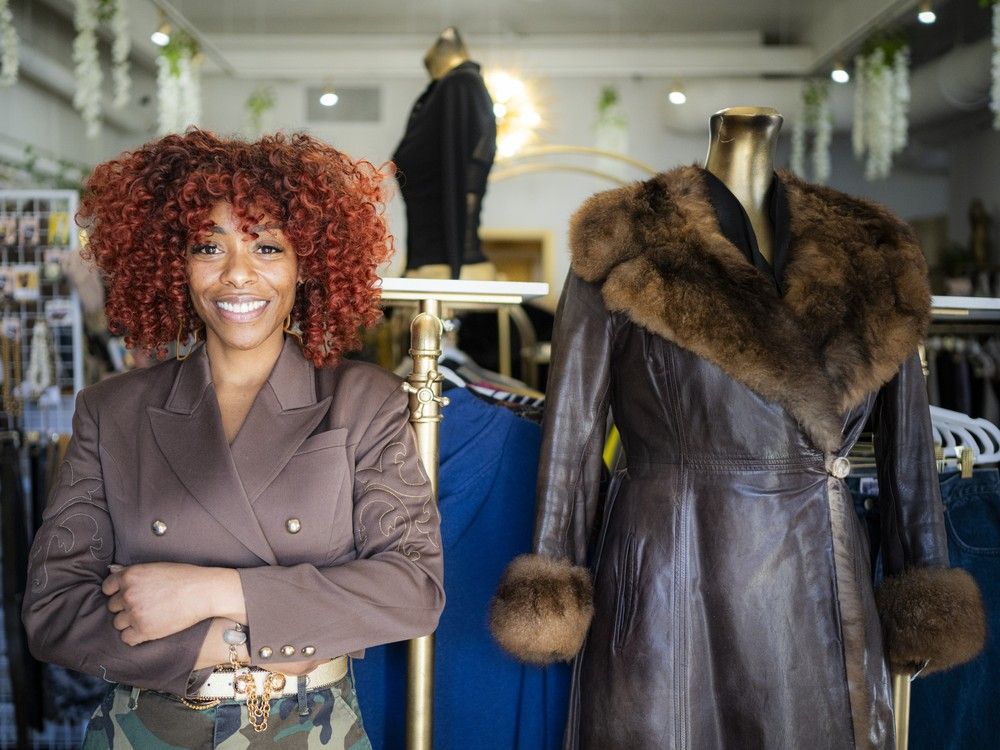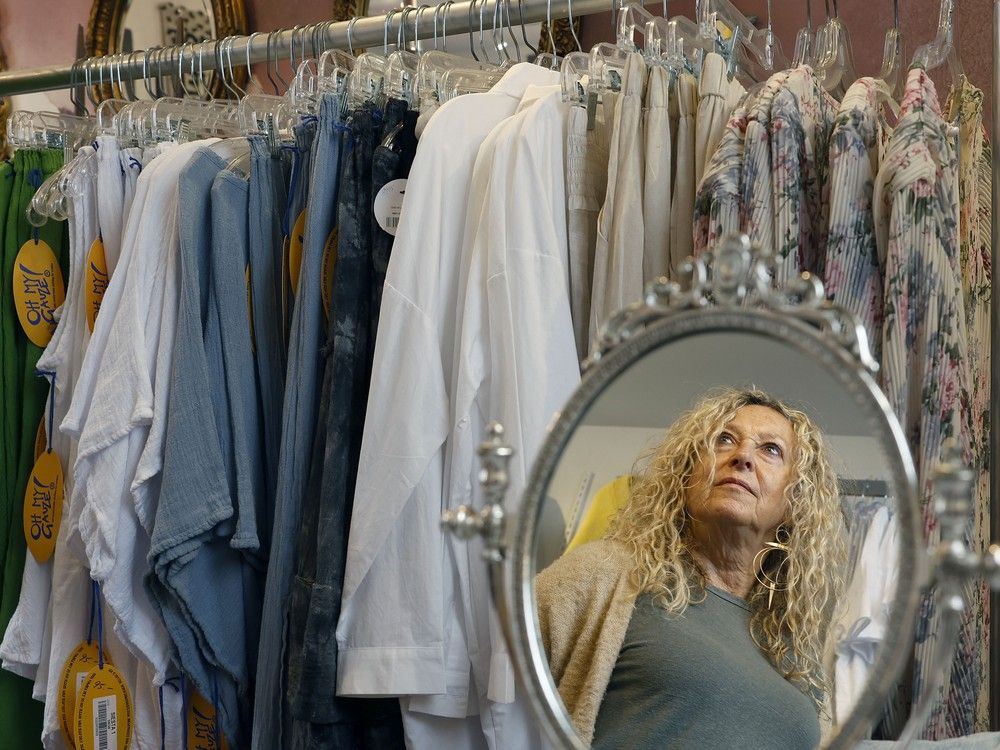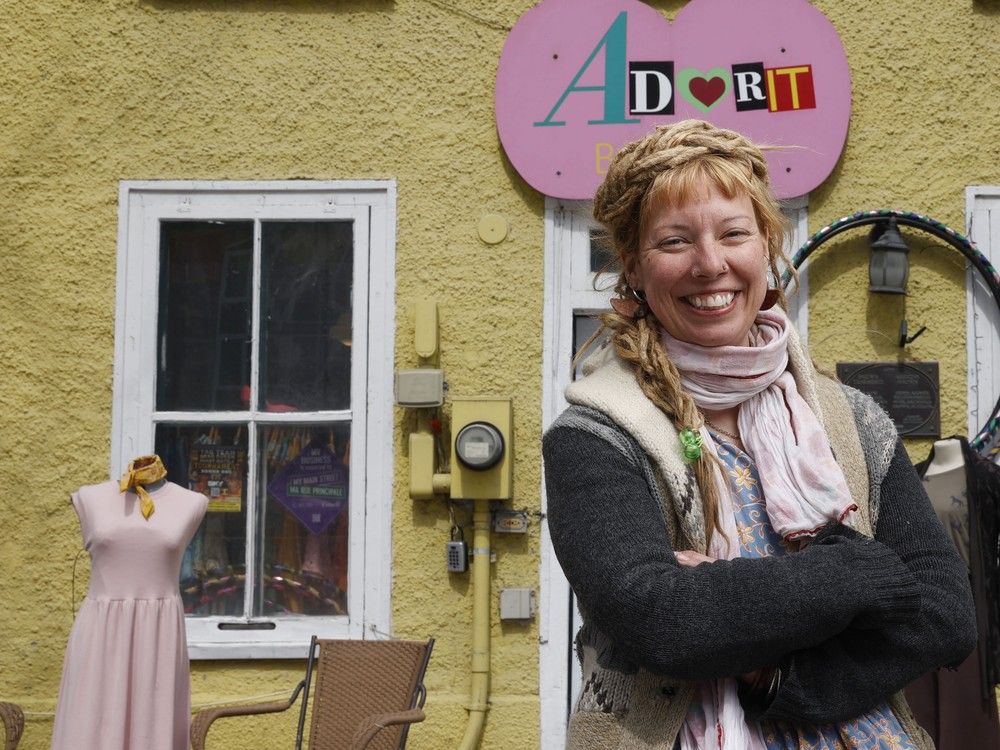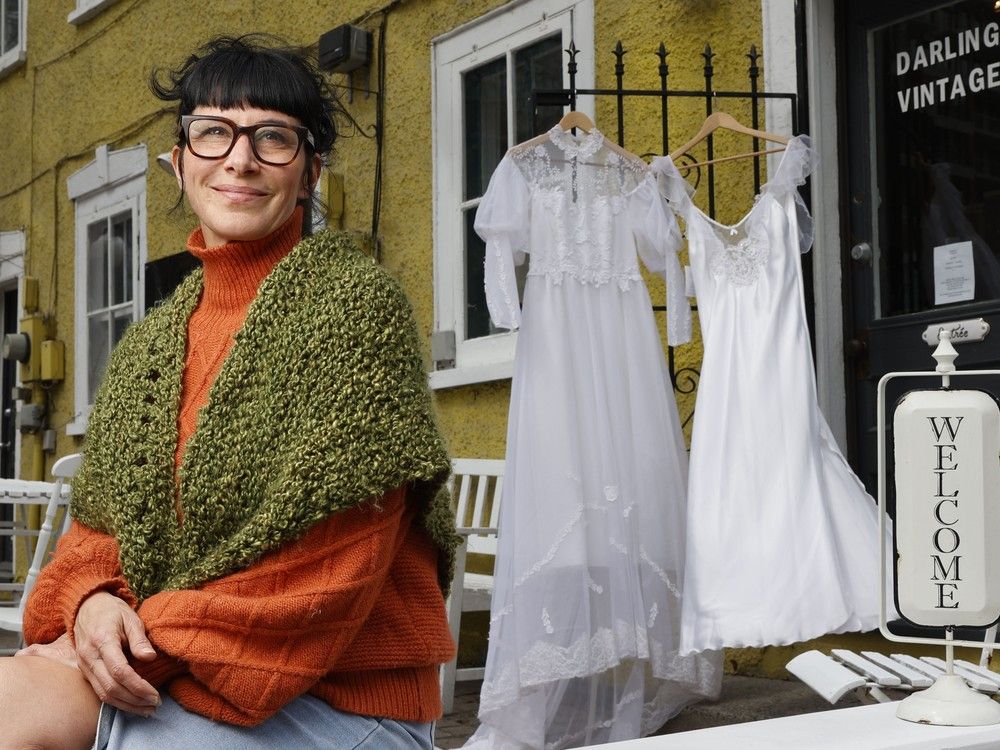After more than a decade in the same location, Ottawa entrepreneur Jamie Mcleod was delighted to secure a new home in the ByWard Market for her vintage clothing shop.
This spring, Darling Vintage joined a concentration of women-owned small businesses located in a 150-year-old string of row houses near the east end of York Street. Two other shops in the pale yellow building also carry vintage clothing, creating a vibrant shopping destination that’s helping revitalize the downtown neighbourhood.
“I had looked at this place six years ago, before (previous tenant) Paul’s Vintage moved in here and I wanted it but I did not get it,” said Mcleod, who’s 48, during a quiet afternoon at her cozy new space, which is lined with racks of formal wear, including the glittering Y2K-era slip dresses that are the latest look for prom season.
“Then the landlord contacted me to let me know that Paul was moving out and that I should grab it,” Macleod added. “I wasn’t going to mess around this time.”
Across the city, the second-hand economy is booming, from the big-box, find-anything Value Village stores to the curated boutique shops in downtown neighbourhoods, with businesses such as Bellwethers, The Jungle, Last Unicorn, Lainey’s Luck and more in the core.
Astute shoppers will also be familiar with the concentration of second-hand stores that have evolved on Merivale Road, where a large Value Village location anchors a string of not-so-curated thrift stores along the busy thoroughfare. Most of them pay nothing for their inventory, instead relying on donations of clothing and household items to fill the racks.
The Merivale strip also includes Thrive Select Thrift, which is a non-profit enterprise run by Big Brothers Big Sisters of Ottawa, Re-Source Thrift Shop, a volunteer-run operation raising money for Christian education, and two consignment stores, Plato’s Closet and the Thrifted Mini, for children’s clothes.
Other pockets of thrift shops exist on the fringes of the city, in places like Almonte, Smiths Falls and Wakefield.
It all adds up to a thriving second-hand apparel economy in the region, which is reflected across the country. Sales of resale clothing in Canada were estimated at $4.2 billion in 2023, and growing fast. According to a report by Value Village, much of it is driven by Gen Z consumers, of whom 60 per cent say that second-hand apparel makes up a quarter of their wardrobe.
In-person shopping dominates the resale market, the report states, with shoppers reporting they spend 6.8 times more at brick-and-mortar stores than online shops.
This trend is represented in the post-pandemic proliferation of brick-and-mortar vintage shops in Ottawa.
Some observers say it’s also an offshoot of the popularity of 613Flea, the twice-monthly independent market in the Aberdeen Pavilion at Lansdowne Park, which features an ever-changing array of wares, ranging from vintage clothing and decor to handmade jewelry, soap and original art, plus more than a dozen food vendors.
Ingrid Daniels used to be a regular 613Flea vendor at Aberdeen until she found her own space on Gladstone Avenue last summer. She now runs a shop called Tribe Co. and its next-door event space, aptly titled Next Door. For her, operating a shop is actually easier than doing a market.
“It’s a lot of physical work at a market,” she said. “You have to make some predictions to select what you want to bring, then you have to put it all in your car. Your racks, your bags, your table, accessories, a mirror. And then you have to unload it all, and reload again when everything’s done. It’s easily a nine-hour day.”

The vision for her Gladstone establishment combines clothing and events, whether it’s a mending session, fashion show, clothing swap, paint night or collaboration with other vendors.
“The concept honestly is to have carefully curated clothing of quality, and to host events,” Daniels said. “There’s a photo studio, too, so I want it to be kind of a community hub where people can come and express themselves.”
For her part, Mcleod came to the sector out of a concern for the environment and dismay at the rise of fast fashion brands. She also loves the styles and fabrics of past decades, from the 1950s to Y2K, and learning the history behind them.
“There’s a surplus of garments that are just being thrown in the landfill,” she said. “It’s so absurd that people are still shopping on Amazon when you can pretty much get whatever you need second-hand.”
Mcleod has been warmly welcomed by her neighbours on York Street. Next door in the yellow building is FrouFrou by Pat, a boutique specializing in original women’s fashion, with a newly added consignment section on the second floor. It’s owned by Pat Pythian, a curly-haired dynamo who’s a bit of a legend in the Market because she’s worked in the area for more than 30 years, first as the manager of the old Sassy Bead shop.
Pythian added the consignment business to her shop after the pandemic, largely because many long-time customers had changed their style.
“COVID really did it because it changed everybody’s personality. They all changed lifestyles and
wanted to clear out their closets,” Pythian explained. “Women were coming in saying, ‘I just can’t buy another dress or another pair of pants because I’ve got too many.’ I said, ‘Well, bring them here. I’ll sell them and give you 50 per cent.’”
Today, the younger customers head straight up the rickety stairs to see what’s come in on consignment. Part of the appeal is the affordable pricing, although social media has also fuelled Gen Z’s desire to stand out.

“They’re getting more and more adventurous, and wearing the crazy stuff to show it on Instagram,” Mcleod said. “They’re having fun with their fashion and using it as a form of expression.”
Also on York Street is Adorit, where owner Emma Inns has been specializing in ethical, slow fashion for 17 years, featuring Canadian designers and fair-trade products from India, Tibet and Nepal. There’s also a thrift section at the back of the store, where she showcases vintage 90s pieces that are all the rage with students.
Inns, who’s 45, hosts occasional clothing swaps outside the store for people to bring the items they don’t want anymore, and trade for items that they like. The last one attracted around 300 people.
“Textile waste is a serious problem, so my message with those events is if you can swap stuff, don’t buy new. And if you can get it free, that’s great,” she said. “And then if you need a few little things to fill in your wardrobe, you can look at ethical, sustainable Canadian designers. That will reduce your carbon footprint by a lot.”

For all of these women, a key business practice is customer service. They love helping to put outfits together and telling you if a certain colour or style is better than another.
Unlike the Value Village and Salvation Army thrift stores, there are change rooms on site and you don’t have to rifle through racks of fast fashion to find something decent. Prices are higher, but you can be assured that items have been cleaned, mended if necessary, and steamed.
Our website is your destination for up-to-the-minute news, so make sure to bookmark our homepage and sign up for our newsletters so we can keep you informed.
Related
- How can we improve the ByWard Market building? Electrical outlets would be a good start
- Deachman: End youth homelessness? This Ottawa group has a plan



